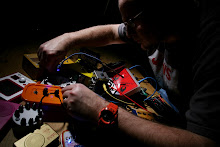Just finished a large set of bass samples for a forthcoming Computer Music and whilst searching out some more unusual sources for lowend rumble came accross this 1U module hiding in a friends loft. It's a Professional Midi Bass module by 360 Systems (I know, I know we'd normally avoid anything with 'proffessional' written on the front as well as they are inevitably not but in this case we'll make an exception). From what little I know (and don't take my word on it) this module was (is?) far more popular in the US than over here and rather than generating any sounds, it plays back samples stored on EPROM chips. This method is exactly the same as the Oberhiem DMX/DX drum machines.
It's a Professional Midi Bass module by 360 Systems (I know, I know we'd normally avoid anything with 'proffessional' written on the front as well as they are inevitably not but in this case we'll make an exception). From what little I know (and don't take my word on it) this module was (is?) far more popular in the US than over here and rather than generating any sounds, it plays back samples stored on EPROM chips. This method is exactly the same as the Oberhiem DMX/DX drum machines.
 It's a Professional Midi Bass module by 360 Systems (I know, I know we'd normally avoid anything with 'proffessional' written on the front as well as they are inevitably not but in this case we'll make an exception). From what little I know (and don't take my word on it) this module was (is?) far more popular in the US than over here and rather than generating any sounds, it plays back samples stored on EPROM chips. This method is exactly the same as the Oberhiem DMX/DX drum machines.
It's a Professional Midi Bass module by 360 Systems (I know, I know we'd normally avoid anything with 'proffessional' written on the front as well as they are inevitably not but in this case we'll make an exception). From what little I know (and don't take my word on it) this module was (is?) far more popular in the US than over here and rather than generating any sounds, it plays back samples stored on EPROM chips. This method is exactly the same as the Oberhiem DMX/DX drum machines. Sounds wise this unit comes with some pretty useful samples from some 'real' bass guitars as well as some synths (moogs ect) and has that punchy, 80's sound quality to it. As ever we've sampled some off (including running the unit through some bass effects pedals) for you to play with and posted them up on our soundclud page here (we've also included the widget player below (hopefully). You can check out the more from this beastie on the cover DVD of Computer Music issue 171
360 Systems Midi Bass Samples by groovecriminals


 Well the first thing we wanted to make sure we did when taking on the classic hip hop expander commission was to make it as authentic as we could and at a basic level this started with the samplers.
Well the first thing we wanted to make sure we did when taking on the classic hip hop expander commission was to make it as authentic as we could and at a basic level this started with the samplers.




